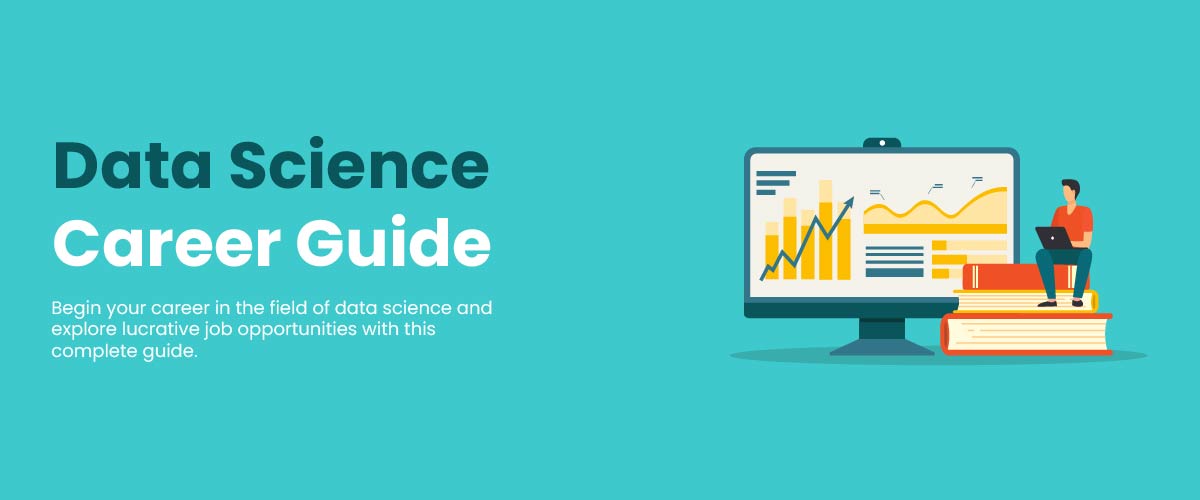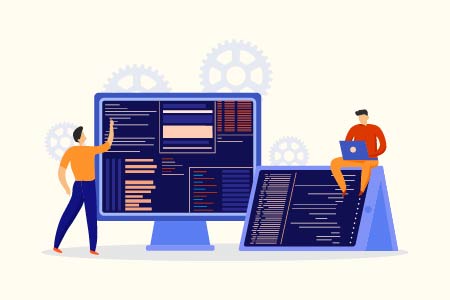Data Science Career Opportunities – The 2025 Guide
The data science career path continues to evolve as one of the most promising and in-demand fields. It offers lucrative growth opportunities in today’s data-driven world. Data science enables you to analyze vast data to provide valuable insights. In this blog, we will gain a comprehensive understanding of the prospects and opportunities that make data science a viable and fulfilling career choice.
What is Data Science?
Data science is a field of study that involves extracting meaningful insights from data for businesses. It combines precepts and techniques from various fields, such as mathematics, statistics, artificial intelligence, and computer engineering to analyze large amounts of data. Data scientists analyze data to explore and visualize data to build models using programming languages such as Python and R.
Evolution of Data Science
The term ‘data science’ has been in use since the 1960s. However, it was used synonymously with ‘computer science’. Later, it was used to define the survey of data processing methods used in several applications. Let us take a look at the past, present, and future trends to understand the evolution of data science:
- Beginning and Early Developments: The origins of data science are traced back to the 1960s and 1970s when computer science and statistics were used collectively. Statisticians were among the first to understand the potential of computers for data analysis. Here are some major developments in this era:
- Early data scientists used mainframe computers for statistical analysis. This was the introduction of data-driven decision-making.
- Databases were introduced during this time, leading to systematic data storage and retrieval. Scientists could now work with structured data.
- Around the 1950s and 1960s emerged the initial form of machine learning. The groundwork for artificial intelligence and machine learning algorithms was laid by researchers like Frank Rosenblatt and Arthur Samuel.
- In the 1980s, data warehousing technology emerged, allowing consolidation and storage of data in a structured way for efficient analysis.
- Data Science Today: In present times, data science has emerged as one of the most influential industries associated with domains like marketing, finance, healthcare, and more. Here are some of the current data science trends:
- AI and ML technologies are prevalent and have introduced predictive analysis, automation of tasks, recommendation systems, etc.
- Businesses actively utilize data science to make business decisions, optimize operations, identify growth opportunities, and improve customer experiences.
- Data science has led to increased personalization where users get curated content based on their behavior and preferences in digital space.
- Big data analytics have led to the introduction of advanced analysis tools and techniques like Hadoop and Spark. Now, data scientists can gain insights from large data sets easily.
- Future of Data Science: The domain is constantly changing and evolving into a more advanced version. Here are some of the future trends that experts have predicted for data science:
- Advanced analytics will be made possible with an even more seamless integration of artificial intelligence into data science. Automated machine learning (AutoML) is said to be more accessible in the future.
- Data science will merge with augmented reality to provide enhanced user experiences in the fields of gaming, entertainment, and education.
- With the increased use of data for advanced decision-making, ethical concerns will grow, bringing forth the issues of privacy and fairness.
- The introduction of quantum computing will revolutionize data analysis and enable professionals to handle complex problems at a much faster rate.
The evolution of data science begins from a more formal and strict discipline to an interdisciplinary field that integrates with other domains on the way to making path-breaking discoveries. While the advancements are transforming the decision-making process, some ethical concerns have emerged as well, calling for more responsibility.
Scope of Data Science in 2024
Experts believe that data science will become one of the highest-valued careers in 2024. Jobs in this domain are expected to grow by 36% from 2021 to 2031, highlighting huge potential and opportunities for growth.
Further, jobs based on data science, like data scientist, machine learning engineer, and data analyst, were among the highest-paying job roles in recent years. The global market for data science is projected to reach around $103 billion by 2027. Therefore, aspiring data scientists can expect a surge in career opportunities. To begin a career in this field, consider taking an online data science course with a placement guarantee, through which you can enhance your skills and knowledge and get placed in reputed companies.
How to Start a Career in Data Science?
If you are wondering how to start a career in data science, you will need a relevant educational background, technical skills, soft skills, and work experience. Here we have outlined the steps to begin a career in data science.
1. Educational Qualifications:
To begin your journey in the field of data science, it is essential to have an educational background in computer science, mathematics, or statistics. In addition to this foundation knowledge, you also require a good understanding of various data science tools in the industry. As such, it is essential to have the following qualifications:
- Bachelor’s Degree: A bachelor’s degree in data science, business, economics, statistics, mathematics, information technology, or a related field can boost your chances of getting hired.
- Master’s Degree: You can pursue a master’s degree in data science to gain advanced skills in the field.
- Certification: With online data science courses, you can build credibility and enhance your skillset.
- Bootcamps: Bootcamps provide intensive data science projects to help you quickly acquire practical skills.
2. Technical Skills:
The following are some of the key technical skills you should acquire to pursue a career in the field of data science:
- An in-depth knowledge of statistical analysis.
- Familiarity with machine learning, deep learning, mathematics, and statistics.
- To present the extracted insights to all stakeholders, you should possess data visualization skills.
- Ability to manage unstructured data and process it accordingly for analysis.
- Familiarity with data analysis tools like Excel, SQL, Python, and R.
- Understanding of big data processes, systems, and networks.
- Proficiency in data optimization techniques.
3. Soft Skills:
Data science experts work with other engineers, developers, coders, analysts, and business managers. Therefore, possessing the following soft skills becomes crucial.
- Strong communication skills allow you to present data and insights accurately and effectively.
- Critical and logical thinking skills are imperative to work in the data science field. You should be able to draw connections and patterns in the data to extract meaningful insights.
- Effective problem-solving skills ensure that you can identify problems and provide solutions accordingly.
- With adaptability and flexibility, you can work in any dynamic and challenging environment with ease.
- Good teamwork skills ensure you collaborate well with other team members to timely complete the projects.
- With strong leadership skills, you can take initiative and lead the team to achieve the collective objectives.
4. Get an Internship:
Once you have acquired the relevant education and skills, it’s important to apply your expertise in a professional setting. The best way to gain practical knowledge as a fresher is by pursuing internships. You should craft your resume for internships to streamline the application process and step into the data science career path.
5. Apply for Jobs:
The field of data science is experiencing significant growth, with an increase in both job opportunities and specialization options. You can begin a career in data science by applying for job roles like data scientists, data analysts, and data engineers.
Data Science Career Opportunities
The following are some of the careers you can pursue in the field of data science:
1. Data Scientist
Data scientists collect, analyze, and interpret data to drive decision-making in an organization. They use advanced analytical techniques, such as machine learning and data modeling to analyze relevant information from large volumes of data.
- Average Salary – ₹28.5 LPA
- Required Skills – Statistics, mathematics, machine learning, deep learning, programming skills, and data analysis.
- Education – A bachelor’s degree in Computer Science, Statistics, Data Science, or a related field. Mastering Python, Statistics, and Predictive Modeling can be beneficial.
2. Data Analyst
Data analysts analyze sets of data to provide solutions for organizational problems. They transform raw data into informational insights and help in decision-making. They also organize and store accurate data related to sales numbers, market research, and logistics.
- Average Salary- ₹35 LPA
- Required Skills – Analytical skills, and technical skills like programming languages (SQL, Python, R, SAS), statistics and math, and data visualization.
- Education – A bachelor’s degree in mathematics, statistics, economics, or a related field. A statistics training course can help you learn about probability distribution, hypothesis testing, regression, and different types of statistical analyses to build a strong foundation in statistics for data analysis.
3. Data Engineer
Data engineers design, maintain, and optimize data infrastructure for data collection, management, transformation, and access. They create a pipeline that converts raw data into a usable format for data scientists and consumers. They collaborate with data scientists to build machine learning and analytics infrastructure from testing to deployment.
- Average Salary- ₹24.2 LPA
- Required Skills – Knowledge of programming languages, such as Java, and frameworks like Apache Hadoop. Well-versed in operating systems like UNIX, Linux, and Windows.
- Education – A bachelor’s degree in computer science, software engineering, or a related field. An online SQL course will help in managing relationship database management systems and issuing optimized queries.
4. Data Architect
Data architects analyze an organization’s data infrastructure, plan future databases, and implement solutions to store and manage data. They visualize and design an organization’s enterprise data management framework. This framework is then used to plan, specify, create, maintain, use, and control data.
- Average Salary– ₹26.6 LPA
- Required Skills – Knowledge of programming languages, such as Python, C/C++, and Java, data mining and management, machine learning, and data modeling.
- Education – A bachelor’s degree in data, computer science, or a related field. Proficiency in data modeling and design, including SQL development and database administration.


5. Machine Learning Analyst
These professionals design and implement machine learning models to perform statistical analysis. ML analysts train and retrain systems to optimize their performance. Further, they monitor the system’s performance and evaluate data to ensure accuracy.
- Average Salary- ₹20.6 LPA
- Required Skills – Knowledge of tools such as Spark, Hadoop, R, Apache Kafka, Tensorflow, Google Cloud Machine Learning Engine, and more.
- Education – A bachelor’s degree in computer, mathematics, statistics, economics, or a related field. A master’s degree or even a Ph.D. in computer science or related fields is preferred. A data structure and algorithm course will help you in learning about arrays, linked lists, stacks & queues, graphs, and more.
6. Business Intelligence Analyst
Business intelligence analysts help organizations use already collected data to enhance efficiency. They examine an organization’s procedures and functions to find areas to increase profit margin and effectiveness. They are experts in data mining, data analysis, and recommending growth strategies and technological advancements.
- Average Salary- ₹35.7 LPA
- Required Skills – Knowledge of SQL and Excel, data visualization, financial modeling, and financial analysis.
- Education – A bachelor’s degree in Economics, Finance, Computer Science, Statistics, Business, or a related field.
What are the High-Paying Jobs in Data Science?
In the realm of data science, cutting-edge technology, and analytical prowess open the door to endless opportunities. With its transformative power, data science has made available prospects in diverse industries, leading to several rewarding careers. Here are some of the high-paying jobs in data science that you can explore:
| Job Roles | Highest Salary |
| Data Scientist | ₹28 LPA |
| Data Architect | ₹50 LPA |
| Machine Learning Engineer | ₹45 LPA |
| Data Engineer | ₹21 LPA |
| Cloud Architect | ₹45 LPA |
Benefits of Working in Data Science
Data science has emerged as one of the most promising careers in recent years because of the availability of vast employment opportunities and lucrative compensation packages. Let us discuss these and other benefits of working in data science:
- High Demand: Data science is considered one of the fastest-growing industries with a high demand for skilled individuals. You can find employment in several fields, like finance, technology, healthcare, retail, telecommunications, manufacturing, etc.
- Exciting Responsibilities: Data science entails handling extensive datasets and crafting algorithms, offering intellectually stimulating and captivating challenges.
- Diverse Career Prospects: You can find ample opportunities in the data science field. Some popular roles other than the role of data scientist include data analyst and data engineer.
- Attractive Remuneration: Data scientists earn a generous income in alignment with their expertise and the high demand for their specialized skills in the market. The highest salary of a data scientist in India is 28 LPA.
Limitations of Working in Data Science
While there are several benefits of working in the data science field, it has some limitations as well. Let us discuss these challenges and how to overcome them:
- Technical Complexity: You need to master skills like coding, machine learning, statistics, and more to work in data science. This can be challenging to learn and become proficient in. Overcoming technical complexity requires continuous learning. Enroll in online courses, attend workshops, and read technical blogs and articles to enhance your skills.
- Limited Resources: Depending on the location, level of technological infrastructure, and industry demand, you may find limited resources such as hardware, software, or funding. However, you can overcome this challenge by leveraging cloud computing services that offer scalable and affordable solutions for data storage and computing.
- Time-Consuming: Data science projects may take several months or years to complete because of the intricate processes involved in data collection, cleaning, analysis, model development, and validation. You can break down projects into smaller tasks and prioritize them according to their importance. To manage workflows and complete projects within deadlines, you can use tools like Asana and Trello.
- Data Quality: You need high-quality data to perform accurate analysis and gain insights. However, data quality can be compromised due to anomalies, discrepancies, or errors, leading to inaccurate results. With the help of the best data cleaning and preprocessing tools and techniques, you can minimize errors and improve the accuracy of your results.
Conclusion
Data science is a good career option. Whether your goal is to earn a high salary or make impactful decisions based on data, a career in data science offers endless possibilities. It offers many opportunities and growth prospects in today’s data-driven world. In this blog, we explored the potential data science career paths and how to begin a career in this field. Also, explore data science salaries in India to know more about the latest salary trends and opportunities.
FAQs
Yes, it is worth becoming a data scientist. It is a great career with plenty of opportunities and potential for professional growth. The demand for data scientists is increasing and will continue to be steady in the coming years. Further, this profession offers a competitive salary and benefits, making it an attractive career option for many individuals.
Data scientist, machine learning engineer, machine learning scientist, infrastructure architect, enterprise architect, etc., are some of the career paths in data science.
The data science job is difficult because of factors like a steep learning curve and the requirement of knowledge in mathematics, statistics, and computer science. However, if you are a dedicated individual proficient in relevant skills, you can ace the job without any difficulty.
Yes, data science does require coding. To become a data scientist, you should have an understanding of programming languages, such as Python and R, to create machine-learning models and handle large datasets.
The salary range of a data scientist is ₹6 LPA to ₹28 LPA. The compensation varies according to several factors, including skills, experience, expertise, education qualifications, location, and mode of employment.
Data science is an evolving field and will grow in the future as more data is generated. With exponential growth in the digital world, data science will grow significantly over the next 10 years in diverse industries like finance, education, healthcare, entertainment, and more.
Students with 50% to 60% marks in the 10+2 exam can pursue a data science undergraduate degree. Basic knowledge of statistics, mathematics, and computer programming is required. To pursue data science after graduation, you should have a degree in science or engineering with 50% to 70% aggregate marks.
Though artificial intelligence can automate some of the key data science tasks that are repetitive and time-consuming, it is less likely to replace the domain completely. Experts believe that AI will become an intelligent assistant to data scientists instead. The automation technology of AI with the analytical skills of data scientists will transform the domain in the future.
Yes, at times, AI does need a data scientist. A data science professional cleans the data and processes it to extract essential information to provide it to an AI model for learning. Therefore, data science is considered an interdisciplinary field that incorporates an understanding of AI and ML.







